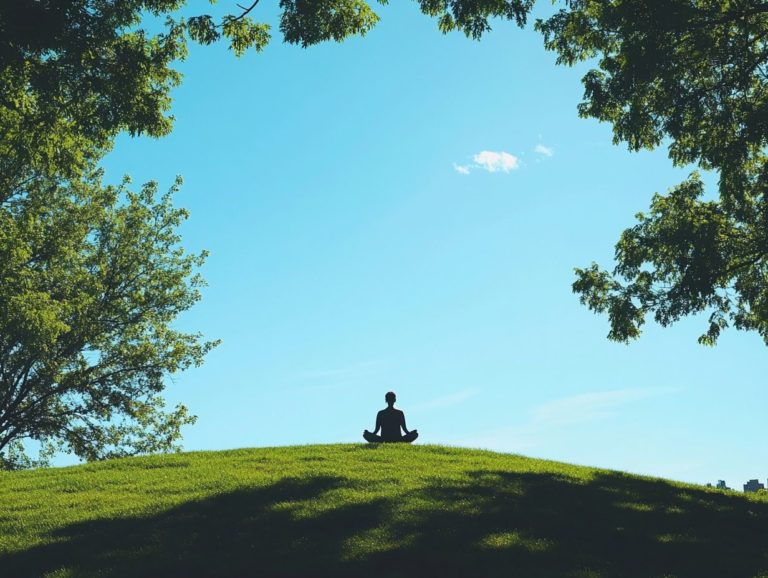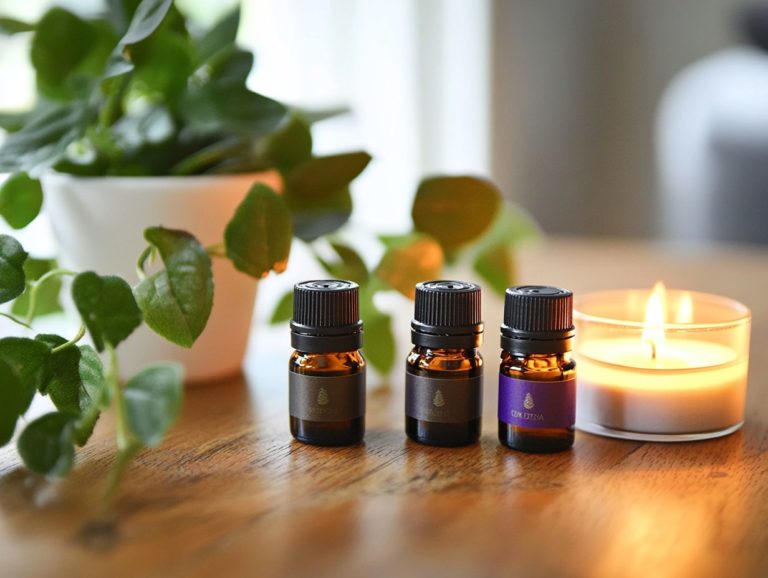5 Inspirational Quotes for Mindfulness
Mindfulness is more than just a trendy term; it’s a profound practice capable of transforming your daily existence.
In this article, you ll explore five inspirational quotes that underscore the significance of living in the present moment. Each quote acts as a gentle reminder of how mindfulness can enrich your experiences, allowing you to appreciate the little things that often slip by unnoticed.
You ll delve into the benefits of mindfulness, tackle common misconceptions, and uncover practical tips for weaving it into your routine. Embrace mindfulness today and unlock a richer, more fulfilling life!
Contents
- Key Takeaways:
- 1. “The present moment is the only time over which we have dominion.” – Thich Nhat Hanh
- 2. “You must live in the present, launch yourself on every wave, find your eternity in each moment.” – Henry David Thoreau
- 3. “The little things? The little moments? They aren’t little.” – Jon Kabat-Zinn
- 4. “The best way to capture moments is to pay attention. This is how we cultivate mindfulness.” – Jon Kabat-Zinn
- 5. “Mindfulness is simply being aware of what is happening right now without wishing it were different.” – James Baraz
- How Can Mindfulness Improve One’s Life?
- Frequently Asked Questions
- What are some examples of inspirational quotes for mindfulness?
- How can these quotes help with mindfulness?
- Can these quotes be used for meditation?
- Are these quotes only relevant to a certain group of people?
- Can these quotes be used in daily life?
- What are some other benefits of practicing mindfulness?
Key Takeaways:

“Live in the present moment and find your eternity in each moment.” – Henry David Thoreau
“Pay attention and capture moments to cultivate mindfulness.” – Jon Kabat-Zinn
“Mindfulness is being aware of the present without wishing for something different.” – James Baraz
1. “The present moment is the only time over which we have dominion.” – Thich Nhat Hanh
The teachings of Thich Nhat Hanh serve as a poignant reminder that the present moment is the only true domain you possess. By embracing mindfulness, you can significantly enhance your happiness and emotional well-being.
In a world overflowing with distractions, practicing mindfulness gives you the power to cultivate awareness and fully engage in each moment. This fosters deeper connections in your relationships and elevates your overall quality of life.
This principle is also important in the workplace, where mindfulness can boost both productivity and job satisfaction. Being present transcends mere philosophy; it becomes a powerful tool for enriching your daily experiences.
By consciously redirecting your focus to the present, you can navigate the challenges of daily life with increased clarity and resilience. Try mindfulness techniques like deep breathing, body scans (a technique that helps you focus on different parts of your body), and meditation a practice that helps clear your mind and focus on the present. These techniques effectively reduce stress and anxiety.
As Eckhart Tolle eloquently puts it, “Realize deeply that the present moment is all you ever have, underscoring the crucial importance of living in the moment. This shift in perspective not only enhances your mental health but also nurtures your relationships, as being fully engaged with others fosters trust and empathy.
Ultimately, embracing the present can lead you to a more fulfilling and balanced life.
2. “You must live in the present, launch yourself on every wave, find your eternity in each moment.” – Henry David Thoreau
Henry David Thoreau urges you to fully embrace each moment, seamlessly weaving mindfulness into your daily life. He reminds you that true happiness resides in your ability to appreciate the present and discover meaning in your experiences.
By immersing yourself in the here and now, you unlock the door to deeper connections with those around you. This enriches your interactions and nourishes your emotional well-being.
This commitment to living in the moment heightens your appreciation for life s fleeting beauty and paves the way for stress reduction through various mindfulness practices.
Engaging in techniques like deep breathing, meditation, or even taking a mindful walk encourages you to slow down, observe, and connect with your surroundings more profoundly. This approach cultivates inner peace and sparks a sense of gratitude, allowing you to experience life s richness with clarity and purpose.
3. “The little things? The little moments? They aren’t little.” – Jon Kabat-Zinn
Jon Kabat-Zinn profundamente te recuerda que los momentos aparentemente insignificantes que a menudo se pasan por alto son, de hecho, fundamentales para tu viaje de mindfulness. Cultivar la apreciaci n por estas peque as cosas puede desencadenar un profundo crecimiento personal y bienestar emocional.
Apreciar estos momentos eleva tu pr ctica de mindfulness, fomentando un sentido de calma y relajaci n que se filtra en tu trabajo y en tus relaciones. Reconocer la importancia de estas “peque as cosas” te permite nutrir un di logo interno positivo y forjar una conexi n m s fuerte con tu realidad interior, lo que, en ltima instancia, conduce a una mayor felicidad y realizaci n en la vida.
Estos instantes peque os pero impactantes como saborear una taza de caf caliente o compartir una sonrisa con un extra o enriquecen tus experiencias diarias y agudizan tu capacidad de entender y manejar tus emociones y las de los dem s. Cuando practicas activamente la gratitud, tu perspectiva cambia, allanando el camino para conexiones m s profundas y comprensi n en los mbitos personal y profesional.
Si est s buscando entrelazar esta mentalidad en tu rutina diaria, considera t cnicas como:
- Llevar un diario de gratitud
- Practicar afirmaciones matutinas
- Participar en ejercicios simples de mindfulness; mindfulness significa estar presente y consciente en el momento, como la conciencia de la respiraci n.
No esperes m s! Integra estas t cnicas en tu vida diaria y observa el cambio. Al adoptar estas estrategias, puedes cultivar gradualmente una perspectiva m s positiva, nutriendo relaciones que prosperan en la apreciaci n mutua y la satisfacci n en tu trabajo. Esto enriquece tu experiencia de vida.
4. “The best way to capture moments is to pay attention. This is how we cultivate mindfulness.” – Jon Kabat-Zinn

Jon Kabat-Zinn enfatiza que el secreto para capturar verdaderamente los momentos de la vida depende de tu capacidad para prestar atenci n, que es un aspecto fundamental de la mindfulness. Este enfoque mejorado no solo aumenta tu inteligencia emocional, sino que tambi n mejora tu salud mental y equilibrio entre el trabajo y la vida, equip ndote para navegar las complejidades de los entornos de trabajo remotos e h bridos con mayor facilidad.
Incorporando ejercicios de mindfulness, puedes afilar tu concentraci n en las tareas mientras fomentas conexiones m s profundas en tus relaciones, lo que conduce a una mayor satisfacci n laboral y felicidad general. En el mundo acelerado de hoy, no se puede subestimar el valor de refinar tu atenci n a trav s de la mindfulness.
T cnicas como la meditaci n, la respiraci n profunda y la conciencia enfocada se convierten en aliadas poderosas para entrenar tu mente a permanecer presente. Este enfoque intencional trae una gran cantidad de beneficios, como la reducci n de la ansiedad y la mejora de la claridad, lo que, en ltima instancia, mejora tu productividad y creatividad.
Integrar breves pausas de mindfulness ya sea unos minutos de caminata consciente o escuchar m sica suave en tu rutina diaria puede amplificar a n m s estas ventajas. A medida que cultivas tu habilidad para estar presente, no solo enriqueces tus propias experiencias, sino que tambi n influyes positivamente en la cultura laboral, fomentando un ambiente donde la colaboraci n y la innovaci n pueden florecer.
5. “Mindfulness is simply being aware of what is happening right now without wishing it were different.” – James Baraz
James Baraz beautifully captures mindfulness as the art of being fully present without the impulse to change anything. This practice is essential for enhancing your emotional well-being.
When you embrace this state, you cultivate compassion for yourself and others. This can profoundly enrich your relationships and alleviate stress.
Paying attention to your thoughts and feelings lays a solid foundation for personal growth. It encourages a healthier mindset and deeper happiness.
Integrating mindfulness exercises into your daily routine can further solidify this practice. Mindfulness invites you to engage with your thoughts and feelings without judgment, allowing for a richer understanding of your emotional responses.
For instance, simple breathing techniques where you focus on each inhale and exhale anchor you in the present moment. This enables you to observe your emotions without feeling overwhelmed.
Mindful walking, in which you pay attention to the sensations of each step, can also be an incredibly effective tool for reducing anxiety and enhancing mental clarity.
These exercises promote self-awareness and create a nurturing environment for genuine connections with others. They pave the way for healthier, more compassionate relationships.
How Can Mindfulness Improve One’s Life?
Mindfulness can truly transform your life! Imagine experiencing greater happiness and peace every day. It fosters deeper connections in your relationships and promotes a healthier work-life balance.
As you engage in mindfulness practices, you become more attuned to your thoughts and emotions. This awareness allows you to respond thoughtfully rather than react impulsively to life s challenges.
This shift enhances your emotional well-being and elevates your productivity and job satisfaction. Mindfulness is not merely a practice; it is a lifestyle that enriches every aspect of your existence.
By incorporating simple mindfulness techniques into your daily routine like mindful breathing, meditation, or even taking a moment to express gratitude you can cultivate a more positive outlook. These practices act as anchors during stressful times.
In your relationships, mindfulness encourages open communication and empathy. This allows your connections to deepen. In the workplace, implementing mindfulness sessions can foster teamwork and creativity, creating a more harmonious atmosphere.
The ripple effect of these practices can significantly enhance your overall quality of life. Don’t wait! Start incorporating mindfulness into your daily life today for a happier, more fulfilling tomorrow.
What Are the Benefits of Practicing Mindfulness?
Practicing mindfulness presents a wealth of benefits that can significantly enhance your mental health, emotional well-being, and overall happiness. Mindfulness can reduce stress and nurture creativity in your daily life. It helps you engage more deeply with your experiences and empowers you to make conscious choices.
This, in turn, improves your relationships and fosters a positive work culture. Integrating mindfulness techniques into your routine facilitates relaxation and promotes a profound understanding of your inner reality.
Research indicates that regular mindfulness practice can lower cortisol levels, the hormone linked to stress. This ushers in a calmer state of being. For example, those who weave mindful breathing exercises or meditation into their morning rituals often notice a boost in focus and creativity throughout the day. This enhances their problem-solving skills at work.
Studies also show that mindfulness aids in emotional regulation, allowing you to respond to challenges with greater equanimity. This skill translates into your daily interactions, making them more thoughtful and less reactive. As a result, you nurture healthier relationships both personally and professionally.
How Can One Incorporate Mindfulness into Their Daily Routine?

Incorporating mindfulness into your daily routine can truly be a game changer. It enhances how you talk to yourself, refines your breathing techniques, and deepens your awareness of the present moment.
Simple practices like mindful breathing, meditation, and gratitude exercises can easily fit into your busy life, providing you with precious moments of calm amidst the chaos.
Prioritizing mindfulness can significantly improve your emotional well-being, creativity, and overall productivity, ultimately leading to a more fulfilling life.
To get started, think about setting aside just five minutes each morning for deep breathing exercises. Focus solely on your breath to ground yourself.
Journaling about three things you re grateful for can remind you of the positive aspects of your life, shifting your focus from stressors to appreciation.
Carving out time for a brief meditation session during lunch can also refresh your mind.
The secret to these techniques lies in consistency. Regularly dedicating time to practice can significantly heighten your awareness and build your ability to handle stress and bounce back from challenges, giving you the power to navigate life s difficulties with greater ease.
What Are Some Common Misconceptions About Mindfulness?
Numerous misconceptions about mindfulness can stand in your way of fully embracing its benefits. Some might think mindfulness is just about relaxation or that it requires a significant time commitment.
In truth, mindfulness is a flexible practice that enhances mental health and can easily fit into various work cultures. It promotes emotional well-being while reducing stress.
By addressing these misconceptions, you can gain a deeper understanding of mindfulness and its transformative potential.
For instance, you might picture mindfulness as sitting in silence for ages, but short, intentional moments of focus can be just as effective.
Simple practices like taking a few conscious breaths during a chaotic meeting or enjoying a mindful walk during lunch can dramatically boost your clarity and productivity.
Workplaces that encourage brief mindfulness sessions cultivate a culture of awareness and compassion, ultimately benefiting both individuals and teams.
By weaving these principles into your daily routine, you ll find that mindfulness isn t just a luxury; it s a helpful tool for everyday life.
Start practicing mindfulness today to transform your life!
How Can One Overcome Challenges in Practicing Mindfulness?
Overcoming the challenges of practicing mindfulness is crucial for unlocking its full potential. Distractions, negative self-talk, and anxiety can easily hinder your progress.
By understanding your feelings better and extending compassion toward yourself, you can navigate these hurdles more effectively. This transforms mindfulness into a powerful tool for your personal growth journey.
Implementing practical strategies like setting realistic goals and incorporating mindfulness reminders can significantly enhance your practice.
As you embark on this journey, it s essential to recognize that setbacks are a natural part of development.
Instead of giving in to frustration, embracing a mindset of patience can turn these experiences into valuable learning opportunities.
By fostering self-acceptance, you can explore various techniques such as guided meditations or mindful breathing exercises to ease your process.
Regularly reflecting on your progress, no matter how small, reinforces a supportive environment for your growth.
Gradually integrating mindfulness into your daily routines builds consistency, giving you the power to fully embrace the present moment with a gentle heart.
What Are Some Tips for Maintaining a Mindful Mindset?
Maintaining a mindful mindset requires intentional practice and strategies that promote self-acceptance, emotional well-being, and enhanced focus throughout your daily life. Simple mindfulness reminders, such as taking a moment for conscious breathing or engaging in mindfulness exercises, can reinforce this mindset.
By integrating these practices, you can cultivate resilience and creativity, empowering yourself to navigate life s challenges with grace and intention. Set aside brief moments during your day for reflection. A quiet pause while sipping your morning coffee can enhance your practice.
Journaling your thoughts and emotions provides valuable insight and serves as a therapeutic outlet for self-exploration. Emphasizing the importance of being fully present reduces stress and nurtures emotional health, ultimately leading you to a more harmonious and balanced life.
Frequently Asked Questions

What are some examples of inspirational quotes for mindfulness?
1. “The present moment is the only moment available to us, and it is the door to all moments.” – Thich Nhat Hanh
2. “Happiness is not something ready made. It comes from your own actions.” – Dalai Lama
3. “The mind is everything. What you think you become.” – Buddha
4. “In the midst of movement and chaos, keep stillness inside of you.” – Deepak Chopra
5. “Yesterday is history, tomorrow is a mystery, today is a gift, that’s why it’s called the present.” – Alice Morse Earle
How can these quotes help with mindfulness?
These quotes remind us to stay present and aware of our thoughts and actions. They can provide a sense of calmness and clarity, allowing us to be more mindful of our surroundings and our own well-being.
Can these quotes be used for meditation?
Absolutely! These quotes can be used as repeated phrases during meditation to focus the mind and promote a sense of mindfulness. They can also serve as daily affirmations to help cultivate a more mindful mindset.
Are these quotes only relevant to a certain group of people?
No, these quotes can be applied to anyone, regardless of age, gender, or background. Mindfulness is a practice that can benefit everyone, and these quotes serve as universal reminders for it.
Can these quotes be used in daily life?
Yes, these quotes are meant to be applied in daily life. They can inspire and motivate us to stay present and mindful throughout the day, reflecting on our thoughts and actions.
What are some other benefits of practicing mindfulness?
Practicing mindfulness can dramatically improve your life! Experience reduced stress, enhanced happiness, improved focus, increased self-awareness, and better relationships.






